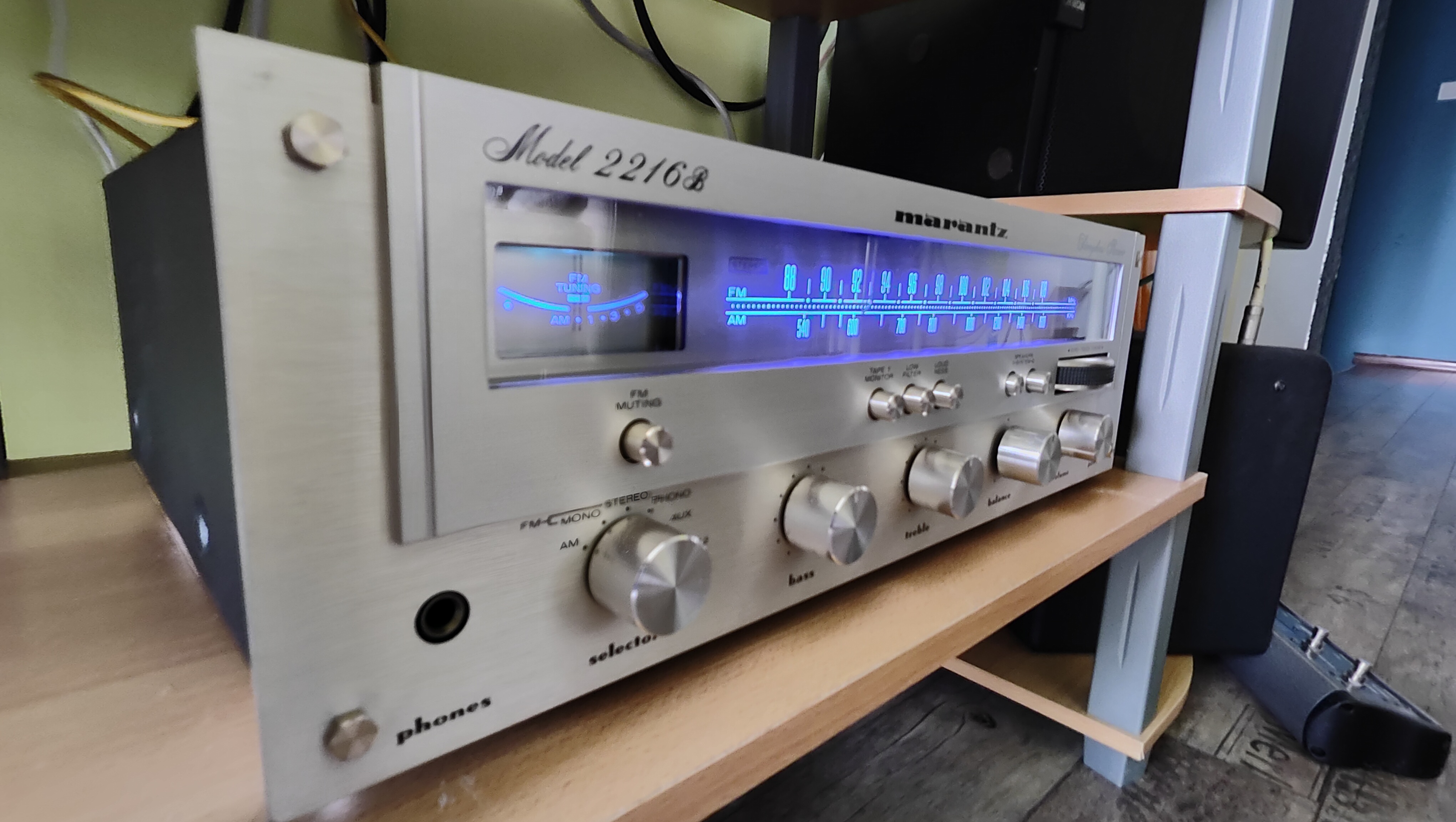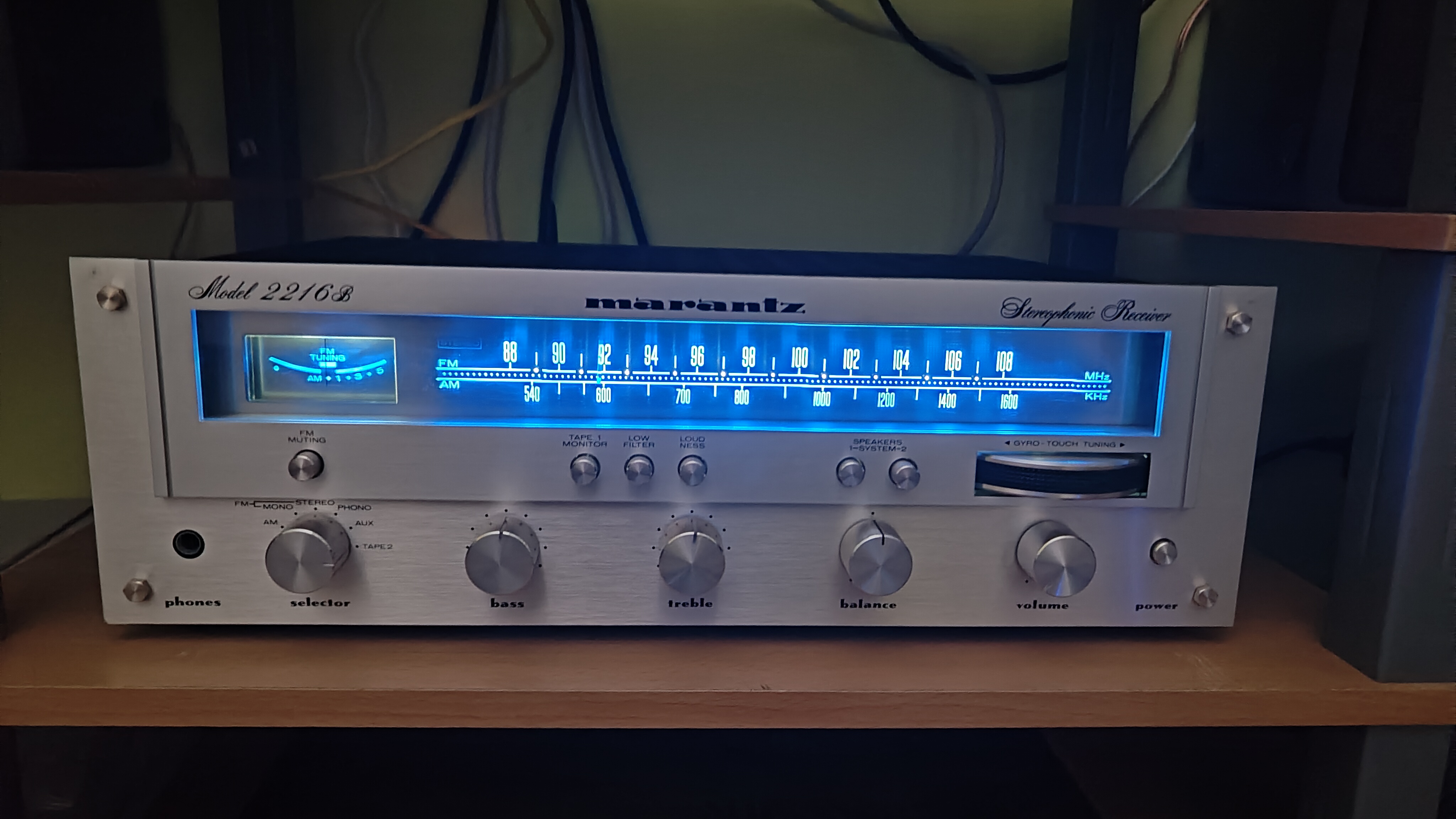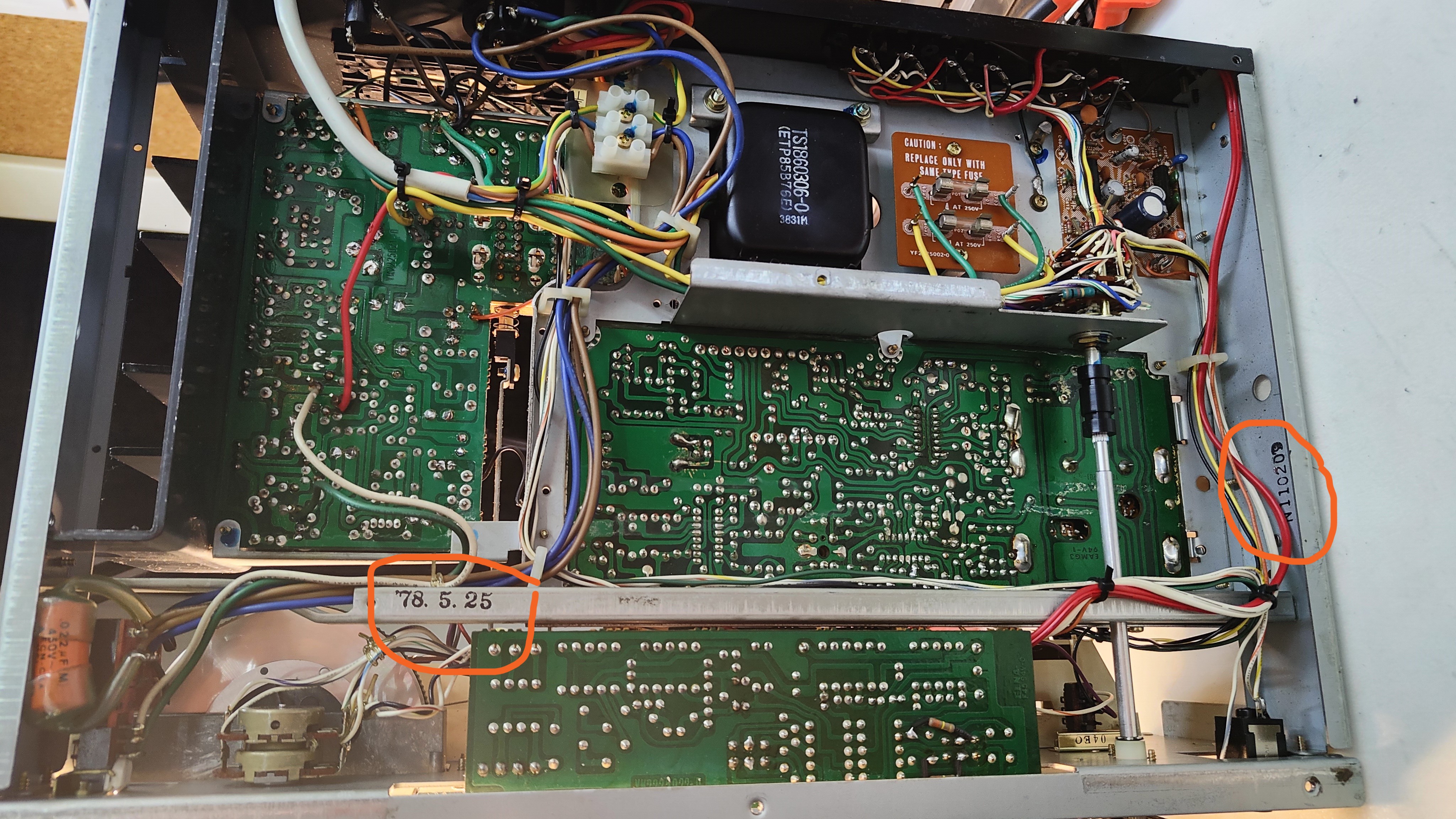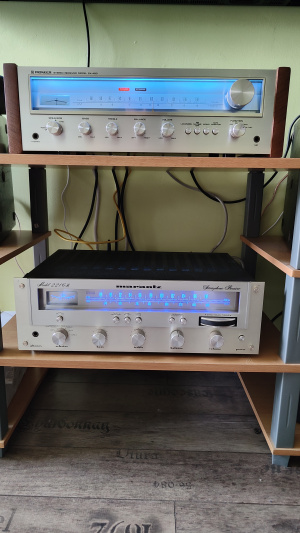Difference between revisions of "Marantz 2216B"
Black CAT II (talk | contribs) |
|||
| (41 intermediate revisions by 3 users not shown) | |||
| Line 1: | Line 1: | ||
| − | {{ | + | __NOTOC__ |
| + | == Data == | ||
| + | {{navigation}} | ||
| + | '''General''' | ||
| + | * Manufacturer: [[Marantz]] | ||
| + | * Model: '''2216b''' | ||
| + | * Years of manufacture: '''1977 - 1978''' | ||
| + | * Made in: '''Designed in USA, Produced in Japan''' | ||
| + | * Color: '''Silver Face''' & rare '''Black Face'''(mainly in Europe) | ||
| + | * Remote control: '''No''' | ||
| + | * Power Consumption: '''97W ±15W (rated) / 27W ±5W (idling)''' | ||
| + | * Dimensions: '''440mm''' x '''137mm''' x '''293mm''' (WxHxD) | ||
| + | * Weight: '''9 kg''' (19.8 lbs) | ||
| + | * New price approx: '''$ 240''' (<small>$240 in 1977 is equivalent in purchasing power to about $1,215 in 2023</small>) | ||
| + | * Produced (Estimate): '''6,800''' items | ||
| − | + | ||
| + | '''Connections''' | ||
| + | * Number of inputs: '''6''' | ||
| + | ** AM / 25 μV | ||
| + | ** FM (Mono) / 1.6 μV | ||
| + | ** FM (Stereo) / 47 μV | ||
| + | ** Phono / 2.7 mV, 47 kΩ | ||
| + | ** AUX / 180 mV, 20 kΩ | ||
| + | ** Tape 1 / 180 mV, 20 kΩ | ||
| + | ** Tape 2 / 180 mV, 20 kΩ | ||
| + | * Number of outputs: '''5''' | ||
| + | ** Tape 1 / 180 mV, 120 Ω | ||
| + | ** Tape 2 / 180 mV, 120 Ω | ||
| + | ** Headphones (6.3mm jack) | ||
| + | ** 2x Speaker terminals (A and B) | ||
| + | |||
| + | '''Technical Data''' | ||
| + | |||
| + | '''Amplifier''' | ||
| + | * Continuous power RMS (at 0.3% distortion). | ||
| + | ** 8Ω: '''16W''' (Dynamic 27W @1% distortion) | ||
| + | ** 4Ω: '''20W''' (Dynamic 33W @1% distortion) | ||
| + | * Total harmonic distortion: '''0.3%''' | ||
| + | * Attenuation Factor: '''40''' | ||
| + | * Frequency Response: '''8Hz - 30kHz''' | ||
| + | * Signal-to-noise ratio: '''85dB''' | ||
| + | * Stereo channel separation: | ||
| + | * Tone control: '''Yes''' | ||
| + | ** Bass: Yes | ||
| + | ** Treble: Yes | ||
| + | * Loudness: '''Yes''' | ||
| + | * High Filter: '''No''' | ||
| + | * Low Filter (Subsonic): '''Yes''' | ||
| + | * Mute: '''No''' | ||
| + | * Direct/Line-Straight: '''No''' | ||
| + | |||
| + | |||
| + | ''Tuner'' | ||
| + | * Reception: | ||
| + | * Frequencies: | ||
| + | ** FM: '''88 - 108 MHz''' (mono and stereo reception) | ||
| + | ** AM: '''540 - 1600 kHz''' | ||
| + | * Frequency response: '''30 Hz - 15 kHz''' | ||
| + | * Input sensitivity: '''40kHz''' deviation | ||
| + | * Distortion factor: '''0.2%''' (mono), '''0.4%''' (stereo) | ||
| + | * Signal-to-noise ratio: '''58 dB - 68 dB''' (stereo - mono) | ||
| + | * Channel separation: '''40dB''' | ||
| + | * Selectivity: | ||
| + | ** AM: '''1Mhz ±9kHz - 20dB'''; | ||
| + | ** FM: '''98Mhz ±300kHz - 50dB'''; | ||
| + | * IF Rejection: | ||
| + | ** AM: '''1MHz - 3dB'''; | ||
| + | ** FM: '''98MHz - 80dB'''; | ||
| + | * AM suppression: '''98MHz - 50dB'''; | ||
| + | * Output level: | ||
| + | * RDS: '''No''' | ||
| + | * Station memory: '''No''' | ||
| + | |||
| + | |||
| + | '''Special Features''' | ||
| + | * FM Muting; | ||
| + | * Low Filter; | ||
| + | * Speakers A, B, A+B | ||
| + | |||
| + | == Remarks == | ||
| + | '''Other models of the same series:'''<br> | ||
| + | * 2216B | ||
| + | * [[Marantz 2226B|2226B]] | ||
| + | * [[Marantz 2238B|2238B]] | ||
| + | * [[Marantz 2252B|2252B]] | ||
| + | * [[Marantz 2265B|2265B]] | ||
| + | * [[Marantz 2285B|2285B]] | ||
| + | |||
| + | |||
| + | '''Additional information:'''<br> | ||
| + | There were two series of the "Golden" Marantz 22XX receivers. | ||
| + | There were the receivers with the dark dial face made during the early 70's (1971 - 1974) and those with the silver dial face made during the late 70's (1977 - 1978). Most of these later series Marantz receivers had a "B" designation, i.e.: 2216B. | ||
| + | |||
| + | Each model was tuned to sound a bit different. The 2230 has a very tube like sound, as do the Marantz "baby" receivers ... the 2215, 2216, 2216B, and 2220. The XX designation stands for wpc output into 8Ω across the entire frequency for a period of 60 minutes. The 2270 was a bit different as it produced 70 wpc into 8Ω and only 45 or so into 4Ω (you would expect it to be different). | ||
| + | |||
| + | The higher wattage receivers ... 2285, 2300, and 2325 are very much in demand. The 2250 and 2265 are nice ones to start out with. | ||
| + | |||
| + | Marantz 22xx models: | ||
| + | |||
| + | *Classic first generation, models include: 2215, 2216, 2220, 2225, 2226, 2230, 2235, 2238, 2240, 2245, 2250, 2252, 2265, 2270, 2275, 2285 | ||
| + | *The early “B” models include; 2220B, 2230B, 2235B, 2250B | ||
| + | *Silver face 22xxB series – The modern 1978 – 1980: 2216B, 2226B, 2238B, 2252B, 2265B, 2285B | ||
| + | |||
| + | The pre-1980 Marantz models are the most desireable. Saul Marantz had sold his company back in the late 60's to Superscope. Superscope was a very benign owner and did not look to muck around with Marantz' original designs. | ||
| + | |||
| + | In 1980, Superscope sold Marantz to Phillips and things were never quite the same afterwards. This is very similar to when Acoustic Research was sold to Teledyne and Fisher was sold to the same conglomerate that made cheap mass market electronics under the names of Emerson (another old time US radio brand that had been sold) and Sanyo. | ||
| + | |||
| + | == Pictures == | ||
| + | '''Side view''' of the Marantz 2216B | ||
| + | [[File:Marantz2216b Side.jpeg]]<br> | ||
| + | |||
| + | How it looks in a '''low light environmen''' | ||
| + | [[File:Marantz2216b LowLight.jpeg]]<br> | ||
| + | |||
| + | Marantz '''stamp production date''' as well as the serial number on the chassi and on the back plate. | ||
| + | [[File:Marantz2216b Serial.jpeg]]<br> | ||
| + | |||
| + | == Reports == | ||
| + | [[File:Stacked 2216b.jpeg|thumb|right]] | ||
| + | Comparison between '''22xx''' and '''22xxB''' series by '''Mark M.J. Scott''' on Jan 11, 2020:<br> | ||
| + | https://markmjscott.medium.com/vintage-marantz-receivers-22xxb-or-not-22xxb-that-is-the-question-every-vintage-hifi-collector-eb85531dd168 | ||
| + | |||
| + | "... | ||
| + | ''Classic 22xx series (including early classic “B”)'' | ||
| + | |||
| + | *''We prefer the higher watt 70 Watts and greater, classic 22xx models with the exception of the 2235B (early B model) which had special warmth and musical sound we loved.'' | ||
| + | *''Higher watt vintage Marantz’s provide a deeper and fuller bottom end (we don’t listen to music loud – you sense the difference with a higher watt receiver, even at lower volumes)'' | ||
| + | *''While the 2220, 2230 and 2245 have a nice warm sound – they are missing a bottom end thump'' | ||
| + | |||
| + | ''Silver face 22xxB models'' | ||
| + | |||
| + | *''The sound is crisper and lighter, more refined and less warm and less coloured (and some people love this). For our ears – the music becomes fatiguing over longer listening periods'' | ||
| + | *''We really enjoyed the Marantz 2285B and we understand the hype and love for that receiver – it has refined power and looks truly stunning.'' | ||
| + | ..." | ||
| + | |||
| + | == Links == | ||
| + | https://classicreceivers.com/marantz-2216b<br> | ||
| + | https://www.youtube.com/results?search_query=marantz+2216b+receiver&sp=EgIYAw%253D%253D<br> | ||
| + | [[Category:Receiver]] | ||
Latest revision as of 07:10, 6 March 2024
Data[edit]
General
- Manufacturer: Marantz
- Model: 2216b
- Years of manufacture: 1977 - 1978
- Made in: Designed in USA, Produced in Japan
- Color: Silver Face & rare Black Face(mainly in Europe)
- Remote control: No
- Power Consumption: 97W ±15W (rated) / 27W ±5W (idling)
- Dimensions: 440mm x 137mm x 293mm (WxHxD)
- Weight: 9 kg (19.8 lbs)
- New price approx: $ 240 ($240 in 1977 is equivalent in purchasing power to about $1,215 in 2023)
- Produced (Estimate): 6,800 items
Connections
- Number of inputs: 6
- AM / 25 μV
- FM (Mono) / 1.6 μV
- FM (Stereo) / 47 μV
- Phono / 2.7 mV, 47 kΩ
- AUX / 180 mV, 20 kΩ
- Tape 1 / 180 mV, 20 kΩ
- Tape 2 / 180 mV, 20 kΩ
- Number of outputs: 5
- Tape 1 / 180 mV, 120 Ω
- Tape 2 / 180 mV, 120 Ω
- Headphones (6.3mm jack)
- 2x Speaker terminals (A and B)
Technical Data
Amplifier
- Continuous power RMS (at 0.3% distortion).
- 8Ω: 16W (Dynamic 27W @1% distortion)
- 4Ω: 20W (Dynamic 33W @1% distortion)
- Total harmonic distortion: 0.3%
- Attenuation Factor: 40
- Frequency Response: 8Hz - 30kHz
- Signal-to-noise ratio: 85dB
- Stereo channel separation:
- Tone control: Yes
- Bass: Yes
- Treble: Yes
- Loudness: Yes
- High Filter: No
- Low Filter (Subsonic): Yes
- Mute: No
- Direct/Line-Straight: No
Tuner
- Reception:
- Frequencies:
- FM: 88 - 108 MHz (mono and stereo reception)
- AM: 540 - 1600 kHz
- Frequency response: 30 Hz - 15 kHz
- Input sensitivity: 40kHz deviation
- Distortion factor: 0.2% (mono), 0.4% (stereo)
- Signal-to-noise ratio: 58 dB - 68 dB (stereo - mono)
- Channel separation: 40dB
- Selectivity:
- AM: 1Mhz ±9kHz - 20dB;
- FM: 98Mhz ±300kHz - 50dB;
- IF Rejection:
- AM: 1MHz - 3dB;
- FM: 98MHz - 80dB;
- AM suppression: 98MHz - 50dB;
- Output level:
- RDS: No
- Station memory: No
Special Features
- FM Muting;
- Low Filter;
- Speakers A, B, A+B
Remarks[edit]
Other models of the same series:
Additional information:
There were two series of the "Golden" Marantz 22XX receivers.
There were the receivers with the dark dial face made during the early 70's (1971 - 1974) and those with the silver dial face made during the late 70's (1977 - 1978). Most of these later series Marantz receivers had a "B" designation, i.e.: 2216B.
Each model was tuned to sound a bit different. The 2230 has a very tube like sound, as do the Marantz "baby" receivers ... the 2215, 2216, 2216B, and 2220. The XX designation stands for wpc output into 8Ω across the entire frequency for a period of 60 minutes. The 2270 was a bit different as it produced 70 wpc into 8Ω and only 45 or so into 4Ω (you would expect it to be different).
The higher wattage receivers ... 2285, 2300, and 2325 are very much in demand. The 2250 and 2265 are nice ones to start out with.
Marantz 22xx models:
- Classic first generation, models include: 2215, 2216, 2220, 2225, 2226, 2230, 2235, 2238, 2240, 2245, 2250, 2252, 2265, 2270, 2275, 2285
- The early “B” models include; 2220B, 2230B, 2235B, 2250B
- Silver face 22xxB series – The modern 1978 – 1980: 2216B, 2226B, 2238B, 2252B, 2265B, 2285B
The pre-1980 Marantz models are the most desireable. Saul Marantz had sold his company back in the late 60's to Superscope. Superscope was a very benign owner and did not look to muck around with Marantz' original designs.
In 1980, Superscope sold Marantz to Phillips and things were never quite the same afterwards. This is very similar to when Acoustic Research was sold to Teledyne and Fisher was sold to the same conglomerate that made cheap mass market electronics under the names of Emerson (another old time US radio brand that had been sold) and Sanyo.
Pictures[edit]
Side view of the Marantz 2216B

How it looks in a low light environmen

Marantz stamp production date as well as the serial number on the chassi and on the back plate.

Reports[edit]
Comparison between 22xx and 22xxB series by Mark M.J. Scott on Jan 11, 2020:
https://markmjscott.medium.com/vintage-marantz-receivers-22xxb-or-not-22xxb-that-is-the-question-every-vintage-hifi-collector-eb85531dd168
"... Classic 22xx series (including early classic “B”)
- We prefer the higher watt 70 Watts and greater, classic 22xx models with the exception of the 2235B (early B model) which had special warmth and musical sound we loved.
- Higher watt vintage Marantz’s provide a deeper and fuller bottom end (we don’t listen to music loud – you sense the difference with a higher watt receiver, even at lower volumes)
- While the 2220, 2230 and 2245 have a nice warm sound – they are missing a bottom end thump
Silver face 22xxB models
- The sound is crisper and lighter, more refined and less warm and less coloured (and some people love this). For our ears – the music becomes fatiguing over longer listening periods
- We really enjoyed the Marantz 2285B and we understand the hype and love for that receiver – it has refined power and looks truly stunning.
..."
Links[edit]
https://classicreceivers.com/marantz-2216b
https://www.youtube.com/results?search_query=marantz+2216b+receiver&sp=EgIYAw%253D%253D
